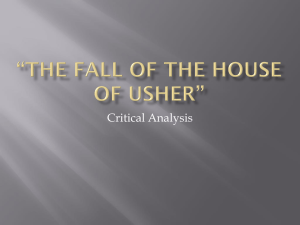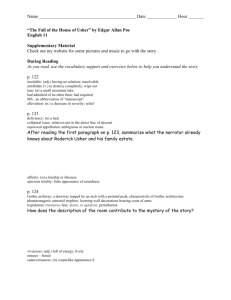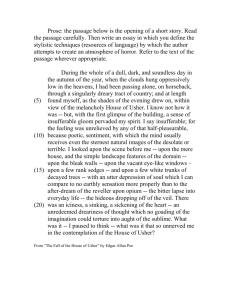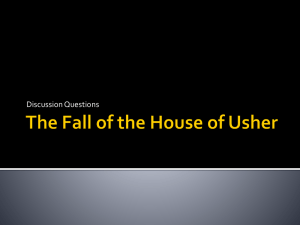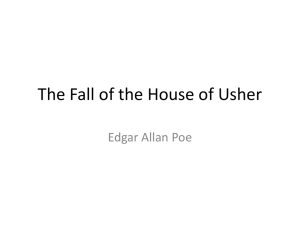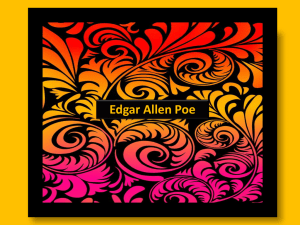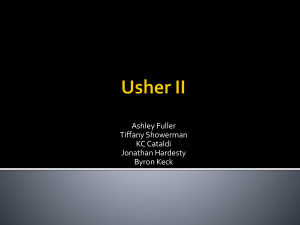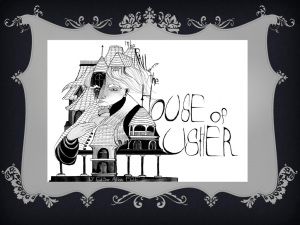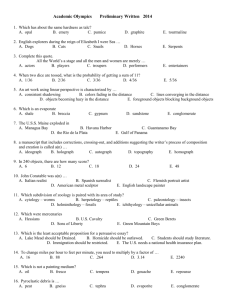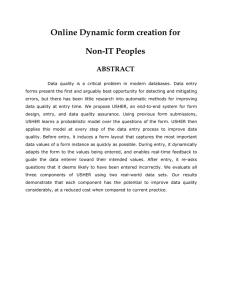“The Fall of the House of Usher” by Edgar Allan Poe
advertisement
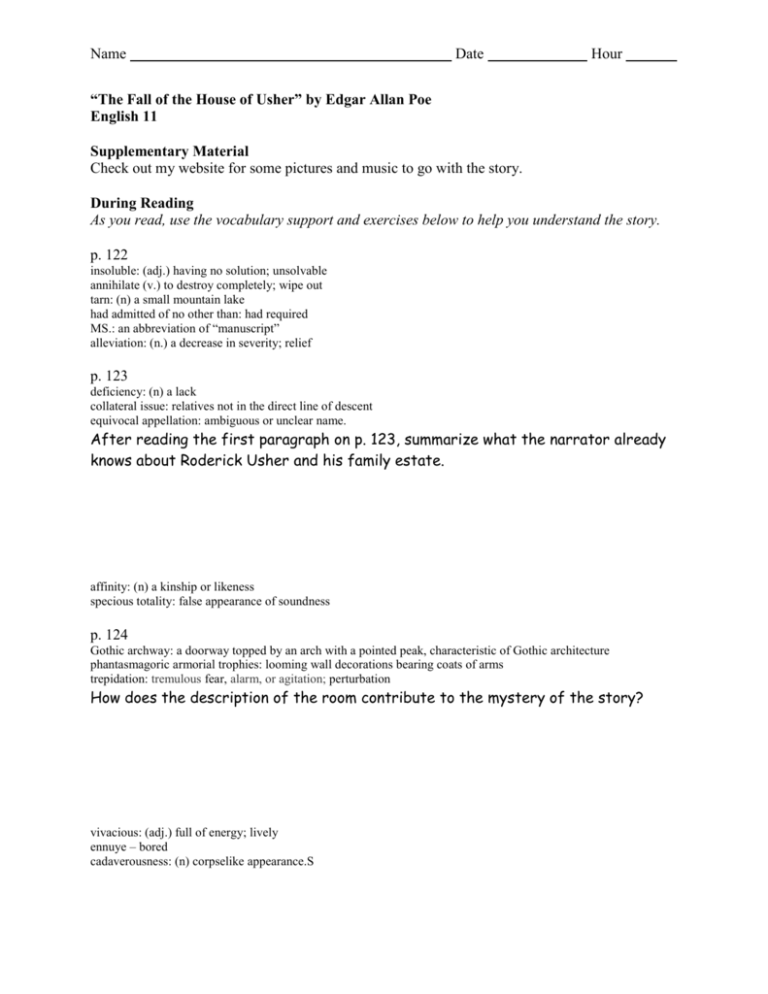
Name Date Hour “The Fall of the House of Usher” by Edgar Allan Poe English 11 Supplementary Material Check out my website for some pictures and music to go with the story. During Reading As you read, use the vocabulary support and exercises below to help you understand the story. p. 122 insoluble: (adj.) having no solution; unsolvable annihilate (v.) to destroy completely; wipe out tarn: (n) a small mountain lake had admitted of no other than: had required MS.: an abbreviation of “manuscript” alleviation: (n.) a decrease in severity; relief p. 123 deficiency: (n) a lack collateral issue: relatives not in the direct line of descent equivocal appellation: ambiguous or unclear name. After reading the first paragraph on p. 123, summarize what the narrator already knows about Roderick Usher and his family estate. affinity: (n) a kinship or likeness specious totality: false appearance of soundness p. 124 Gothic archway: a doorway topped by an arch with a pointed peak, characteristic of Gothic architecture phantasmagoric armorial trophies: looming wall decorations bearing coats of arms trepidation: tremulous fear, alarm, or agitation; perturbation How does the description of the room contribute to the mystery of the story? vivacious: (adj.) full of energy; lively ennuye – bored cadaverousness: (n) corpselike appearance.S Name Date Hour p. 125 arabesque: intricately interwoven (like the design on an Oriental carpet). concision: briefness of communication; terseness malady: illness, sickness insipid: (adj.) lacking in flavor; bland but peculiar: only certain In your own words, sum up Usher’s view of his situation. p. 126 supposititious: supposed wanness: paleness emaciated: excessively thin; wasted away cataleptical: involving paralysis and unconsciousness; trancelike What is so startling about the narrator’s first glimpse of Madeline Usher? futility: uselessness p. 127 distempered ideality: diseased creativity sulphurous luster: lurid glow; nightmarish quality Von Weber: the German romantic composer Karl Maria von Weber educe: to infer or deduce Fuseli – the Swiss-born British painter Henry Fuseli, many of whose works feature fantastic or gruesome elements. What does Usher’s painting suggest to you? impromptus: musical pieces made up as they are played p. 128 the tottering of his lofty reason upon her throne: the instability of his mental state Never seraph… half so fair: no angel ever spread its wing over half as beautiful a structure porphyrogene: a son born to a ruling king Name Date Hour p. 129 How might the poem parallel Roderick Usher’s situation? pertinacity: stubbornness sentience of all vegetable things: consciousness of all growing things collocation: arrangement importunate: persistent, annoying p. 130 “Ververt et Chartreuse” … Pomponius Mela: extravagantly imaginative works of fiction, theology, philosophy, and geography Vigiliae Mortuorum secundum Chorum Ecclesiae Maguntinae: Latin: Wakes for the Dead, in the Manner of the Choir of the Church of Mainz interment: burial sinister countenance of the person whom I met upon the staircase: the evil face of the doctor he met the first day he arrived (remember on p. 124 when he describes the doctor as having a “mingled expression of low cunning and perplexity”? Of course you do!) donjon-keep – dungeon What is strange about Madeline’s face as she lies in the coffin? (also, see p. 131) p. 131 What do you infer about the changes in Usher’s behavior? couch: bed fitfully: in an irregular way; unsteadily incubus: burden Which of the narrator’s experiences in the Usher mansion might have led to what he “endeavored to believe”? Name Date Hour p. 132 stay: wait terrestrial: on the ground; earthly What is the storm like and what is gathering around the house in the storm? miasma: poisonous vapors prolixity: tedious length; wordiness p. 133 to hold parley with: to converse with obstinate: stubborn How would you describe the mood of the story after the narrator thinks he hears “the very cracking and ripping sound which Sir Launcelot had so particularly described”? pesty: poisonous p. 134 romancer: storyteller What effect do the passages from the “Mad Trist” have on the events of the story? narrative: story Name Date Hour What do you predict will happen after the narrator reads about the shield falling to the floor “with a mighty great and terrible ringing sound”? p. 135 On the basis of what Usher is saying in the first paragraph on this page, what do you expect to happen next? aghast: overcome with fear; terrified What happens to Roderick and Madeline Usher? What happens to the Usher house? Name Date Hour After Reading: Character Analysis Understanding the characters in this story is very important to understanding the story itself. Use the following information to help you fill out the character analysis charts. Four Main Methods of Characterization (examples taken from “Winter Dreams” by F. Scott Fitzgerald) A. Narrator’s direct comments about the character 1. Example: “Whatever Judy wanted, she went after with the full pressure of her charm. … She simply made men conscious to the highest degree of her physical loveliness” 2. This directly states that Judy used her beauty and charm to get what she wanted. B. Character’s physical description 1. Example: “She wore a blue gingham dress, rimmed at throat and shoulders with a white edging that accentuated her tan… She was arrestingly beautiful. The color in her cheeks was centered like the color in a picture – it was not a “high” color, but a sort of fluctuating and feverish warmth.” 2. The reader can infer that she is beautiful and that she dresses in a way that shows off her best features. The “feverish” warmth in her cheeks suggests that she might have an energetic and intense personality. C. The characters own actions, words, thoughts, and feelings. 1. After Judy Jones (of “Winter Dreams”) tries to revive the romance between herself and Dexter, she cries and says, “I’m more beautiful than anybody else, …why can’t I be happy?” 2. Judy’s idea that being the most beautiful should mean she is happy implies that Judy thinks beauty is the key to happiness. 3. When she cries, it suggests that she isn’t used to being rejected, again because her beauty has always gotten her whatever she wants. D. The actions, words, thoughts and feelings of other characters. 1. In the story, Mr. Sandwood says about Judy: “My God, she’s good-looking!” To which Mr. Hedrick replies: “Good looking! She always looks as if she wanted to be kissed! Turning those big cow-eyes on every calf in town!” 2. These words confirm that Judy is indeed beautiful. When Hedrick mentions Judy “turning those … eyes” on people, the reader again sees how she uses her beauty to manipulate others. Name Date Hour Fill out the following charts on each character. Be sure to fill out at least four items on each character. Narrator Method of Example or Quote (with page Characterization number) What it shows about character (should be a trait, like generous, irrational, etc.) 1. 2. 3. 4. 5. 6. Roderick Usher Method of Example or Quote (with page Characterization number) 1. 2. What it shows about character (should be a trait, like generous, irrational, etc.) Name Roderick Usher Method of Example or Quote (with page Characterization number) Date Hour What it shows about character (should be a trait, like generous, irrational, etc.) 3. 4. 5. 6. Madeline Usher Method of Example or Quote (with page Characterization number) 1. 2. 3. 4. 5. What it shows about character (should be a trait, like generous, irrational, etc.) Name Madeline Usher Method of Example or Quote (with page Characterization number) Date Hour What it shows about character (should be a trait, like generous, irrational, etc.) 6. The House of Usher Method of Example or Quote (with page Characterization number) 1. 2. 3. 4. 5. 6. What it shows about character (should be a trait, like generous, irrational, etc.) Name Date Romantic Story Analysis Chart English 11 Story Title: “The Fall of the House of Usher” Author: Edgar Allan Poe Romantic Element Fantasy and Imagination Love of Nature Intense Emotion Sympathetic interest in the past, medieval Exotic Places Legends and Myths Death Morbid melancholy; insanity The Supernatural Failed Love Mysticism (spiritual intuition beyond ordinary understanding) Rural Life and the Common Man Evidence in this Story Hour
